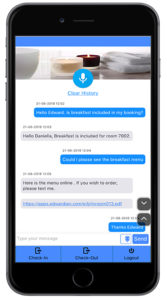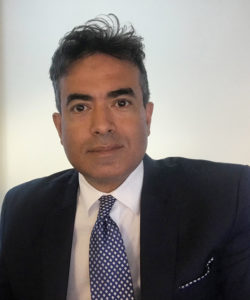With chatbots, virtual assistants and personalised booking platforms becoming more mainstream, Katherine Price explores the opportunities and obstacles artificial intelligence can bring to hospitality and speaks to those operators already ahead of the curve
Would you trust artificial intelligence to check in your guests or answer their queries?
At the 2019 NYU International Hospitality Industry Investment Conference last month in the US, both Rob Torres, managing director for Google Travel, and Cyril Ranque, president of lodging partner services for Expedia Group, agreed they see big opportunities in personalisation via artificial intelligence (AI). But what does this mean, and which technologies should operators be investing in?
A relevant booking journey
AI learning increases over time as it develops algorithms and harvests more data, so hotels that are not already engaging with AI are "losing ground", says Frank Reeves (pictured), chief executive of Avvio, which has developed AI-based booking engine Allora.
"We have hotels that have been on that journey for two years," he says. "The landscape isn't suddenly going to get less competitive, and Google is all in now on travel as well, so the battle's really on for the customer and to own that relationship."
Allora offers users a personalised and relevant booking experience, which Reeves says should be "an urgent priority" for hotels.
"Somebody who's booked your hotel already doesn't need to see a review, or to see a book direct message or a price comparison," says Reeves. "The follow- on should be based around maximising the booking value."
Reeves argues that an AI-forward online strategy should be the priority for hoteliers, as it can directly impact profitability and create the budget to invest elsewhere. Avvio is so confident in its ability to deliver that it guarantees a 25% increase in direct booking revenue.
Enhancing the guest experience
As for the opportunities once guests are on the property, trials involving robots for check-in and checkout so far suggest guests prefer a more human experience.
However, Edwardian Hotels London, which includes the May Fair, a Radisson Collection hotel, in London and 11 Radisson Blu Edwardian properties in the UK, is offering a personalised experience, anticipating and meeting guest needs through Edward.
He says feedback has been "extremely positive", with approximately 32% of guests using Edward, up from 20% when it launched two
Edward has also learned to anticipate guest needs – for instance, nudging housekeeping to leave a guest extra pillows, water or coffee if this is something they have asked for before at any Edwardian property.
Last year, technology company Oracle created a Hotel 2025 survey, in which 47% of respondents in the US said AI-based promotions stemming from past purchases would improve their experience. Some 26% would visit more often if hotels offered this service.
Seeing the results
Mrini says they saw results "immediately" – room service orders via Edward are between 20%-30% higher than those ordered through the phone. On one occasion, a text alerting guests to available slots at the spa had to be switched off because they became "inundated" with requests. He says a lot of guests originally didn't know the hotel had a spa.
Village Hotel Club has seen similar benefits following the introduction of the Amazon Echo Dot in 2017 in some of its properties, which have been customised to allow guests to 'Ask Village' about restaurant, pool, gym and spa opening times, checkout times and wake-up calls. They plan to roll the technology out to 1,000 more rooms by the end of the year.
Chief executive of Village Paul Roberts says they have seen guests become more engaged with the hotel facilities as a result. "It gets away from that bottleneck of the phone," he says.
Back of house
AI also offers big opportunities back of house in analysing data. "People can be reallocated to more productive and value-producing tasks than running reports or crunching numbers or things that a machine can take over," says Klaus Kohlmayr (pictured) of IDeaS Revenue Solutions.
He says it has been "fascinating" to see the amount of data that can be collected and incorporated into revenue management decisions. They have even recently started inputting reputation data into pricing algorithms.
The nine-strong Dorchester Collection, which has three hotels in the UK, including the Dorchester hotel on London's Park Lane, has been using AI system Metis to analyse online reviews and social media for years – a volume of data that would be overwhelming for one member of staff.
How AI can improve back of house efficiencies is a big focus for Village, adds Roberts. They have automated forecasting through revenue management system Duetto and, using Google, can monitor the effects weather or traffic could have on a hotel.
InterContinental Hotels Group even piloted the use of AI in recruitment in Europe, collaborating with UK-based predictive analytics company Cognisess to allocate employees to the 'best fit' brand.
Challenges and opportunities
However, there are still a few challenges, acknowledges Kohlmayr. For these programmes to work, AI systems need to be able to access information across property management, HR, rota, F&B and reservations – all of which could be using different systems.
He sees this technology becoming more mainstream over the next three to five years as legacy systems are phased out and new technologies emerge. Facial recognition, he points out, is already available, and he sees it potentially expanding into the hotel sector in the next 18 months to three years.
"How cool would it be if somebody walks into the hotel and you can already see on your screen who that person is before they even approach the desk? That would completely change the guest arrival experience," he says.
Some 62% of consumer respondents to the Oracle report said automated recognition using biometrics and facial recognition would enhance their experience, and 41% would visit more often if hotels offered this service.
Reeves, meanwhile, feels there is a real opportunity in cancellations. "If you call up your mobile phone company and say that you want to downgrade or you want anything that seems like an intent to reduce your commercial relationship, a whole other side to their business model kicks in; they almost make it difficult," he says. "This is an area where hotels do nothing online."
Continue reading
You need to be a premium member to view this. Subscribe from just 99p per week.
Already subscribed? Log In













